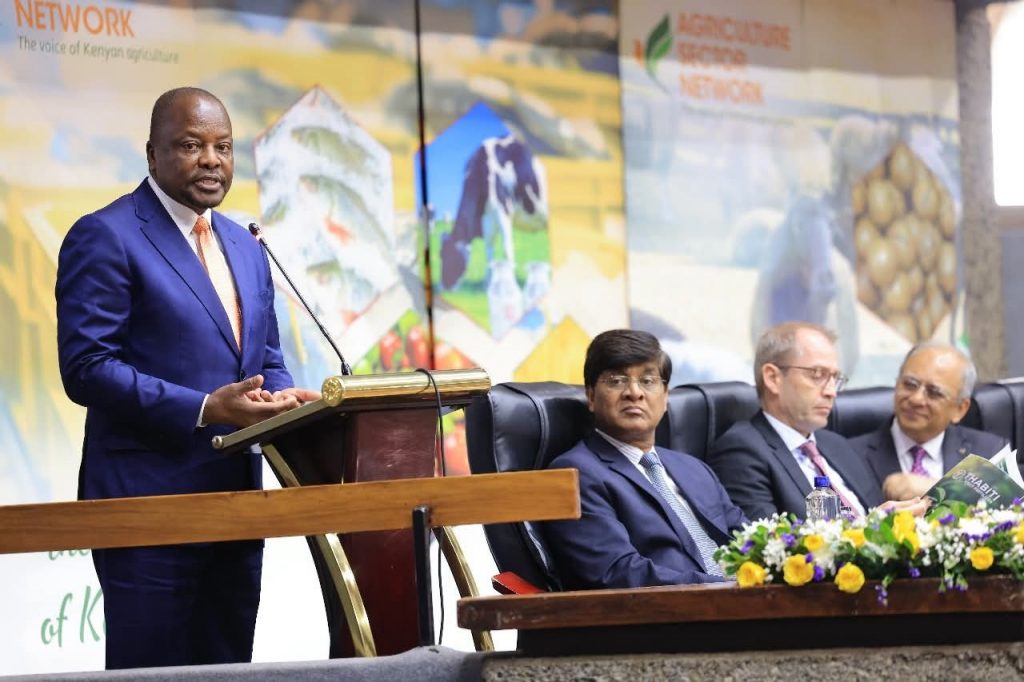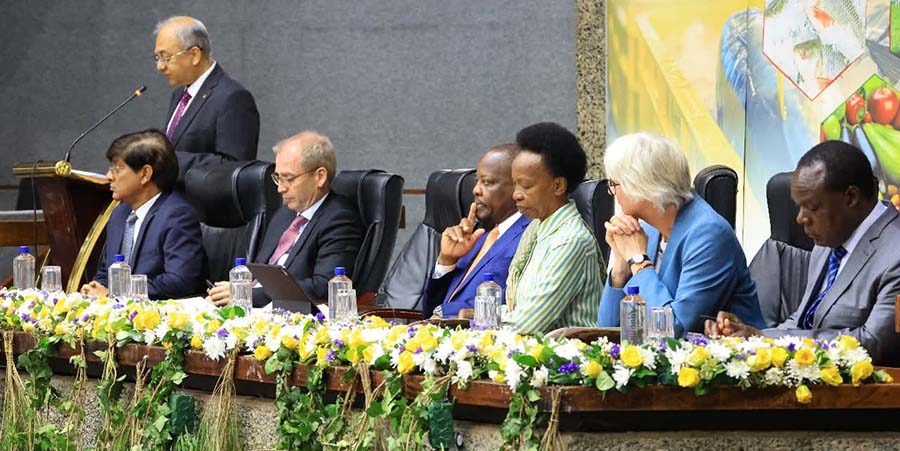Bʏ Mᴀʀʏ Mᴡᴇɴᴅᴇ
October 23, 2025

The 5th National Agribusiness Summit kicked off yesterday at the Kenyatta International Convention Centre (KICC), Nairobi, bringing together key players from government, the private sector, development partners, and farmer organizations to shape the future of Kenya’s agriculture.
Organized by the Agriculture Sector Network (ASNET) under the theme “From Promise to Action: Advancing Agribusiness through Dialogue and Innovation,” the two-day forum has been described as a turning point in efforts to transform agriculture into a competitive, climate-resilient, and investment-ready sector.
Over the past decade, agriculture has consistently underpinned Kenya’s economic stability and food systems. But as policymakers and practitioners acknowledged at the summit, the sector now faces a critical inflection point: the need to move beyond policy commitments into measurable transformation that directly benefits farmers, agripreneurs, and value chain actors.
Driving the Next Phase of Agribusiness Transformation
In his opening statement, Hon. Sen. Mutahi Kagwe, Cabinet Secretary for Agriculture and Livestock Development, said the summit marks “a decisive moment to re-engineer how Kenya’s agricultural sector operates, from production to processing to market-ready export.”
He emphasized that Kenya can no longer afford to rely on exporting raw produce while importing processed goods. Instead, the country must prioritize value addition, mechanization, and innovation as engines for competitiveness and rural prosperity.
“Our goal is clear,” Kagwe said. “To make every acre of Kenyan soil count, every farmer’s sweat valuable, and every harvest export-ready.”
The CS noted that the ministry is scaling up investments in digital agriculture platforms, farmer registration systems, and data-driven interventions to ensure every program is targeted, transparent, and accountable. Central to this effort are initiatives such as climate-smart agriculture, irrigation development, blended agri-finance, and youth and women empowerment through agribusiness incubation hubs and digital cooperatives.
He reaffirmed that modernization cannot happen without inclusion: “No transformation is complete without the inclusion of youth and women, who form the majority of our population and hold the greatest potential for innovation.”
Kagwe also linked the summit to Kenya’s broader agricultural reform agenda under President Ruto’s administration, an agenda that ties food security directly to industrialization and export competitiveness. The ministry’s long-term goal, he said, is to make Kenya “not just a food-secure nation, but a food-exporting one with a globally competitive agribusiness sector.”
Climate-Smart and Data-Driven Growth
The Summit’s sessions delved deeply into climate change adaptation, carbon markets, and data-driven decision-making. With unpredictable weather patterns threatening productivity, Kagwe underscored that climate change “remains one of the greatest challenges of our time,” warning that droughts and floods now threaten not only crop yields but also national stability.
To mitigate this, the Ministry is investing in early warning systems, promoting drought-tolerant crops, and rehabilitating degraded lands. Research, technology, and data innovation, including soil health mapping and improved seed varieties, were highlighted as core tools for achieving sustainability.
“Sustainability is not optional but a necessity,” Kagwe declared. “Protecting our natural resources, managing water wisely, and restoring degraded lands are integral to Kenya’s long-term agricultural vision.” He urged summit participants, including policymakers, investors, researchers, farmers, and development partners, to go beyond discussion. “Let this Summit be more than words. Let it be the spark for practical collaboration, new investments, and shared accountability.”

When Prosperity Becomes a Shared Mission
Echoing the Cabinet Secretary’s sentiments, Dr. Bimal Kantaria, Chairman of ASNET, framed the Summit as a crucial bridge between Kenya’s agricultural promise and tangible outcomes. He noted that agriculture remains the backbone of our economy but stressed that future progress depends on deepening public-private partnerships and translating policy into inclusive action.
“Transformation begins when vision meets commitment,” Kantaria said. “The conversations we hold here must translate into outcomes that are felt in villages, farms, and marketplaces.”
He emphasized that ASNET’s role is to foster strategic collaboration between government, private sector, and development partners to create a more resilient and inclusive food system. Through its 2026–2030 Strategic Plan, ASNET aims to expand financing opportunities for agribusinesses, strengthen value chains, and promote local innovation through youth and SME participation.
Kantaria also highlighted that the summit is not just a platform for dialogue but for “action, innovation, and accountability.” He acknowledged the government’s ongoing support, particularly from the Ministry of Agriculture, for creating an enabling environment for private investment, and called on all players to “embrace this opportunity to build a sustainable and prosperous future for all.”
Bridging the Finance and Market Gap in Agriculture
Among the most dynamic discussions at the Summit were those surrounding agri-finance access for SMEs, carbon trading, and county-led agricultural services. Participants underscored that financial inclusion remains a major constraint for smallholder farmers and emerging agripreneurs, who often face limited access to affordable credit, insurance, and investment capital.
The ministry announced plans to expand blended finance, credit guarantee schemes, and cooperative lending frameworks. These are mechanisms designed to unlock thousands of hectares for productive use and open pathways for young entrepreneurs to enter value-added enterprises.
At the same time, Kenya is looking outward, targeting export diversification in high-value markets across the Middle East, Asia, and Europe. Kagwe reaffirmed Kenya’s ambition to grow into a regional agribusiness hub under the African Continental Free Trade Area (AfCFTA), leveraging partnerships to scale market access for fresh produce, tea, coffee, flowers, and dairy.
Later in the day, the summit will culminate in the National Agribusiness Excellence Awards, celebrating outstanding contributors across the agricultural value chain, from innovators and exporters to cooperatives and county initiatives driving tangible impact on the ground.
If the spirit of the Summit holds true, ‘From Promise to Action‘ may well become more than a theme, it could mark the beginning of a new era in Kenya’s agribusiness, one where every farmer, investor, and innovator has a stake in shaping the country’s sustainable agricultural future.
